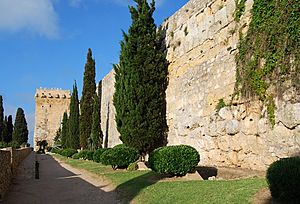Wall of Tarragona facts for kids
Quick facts for kids Wall of Tarragona |
|
|---|---|
| Native name Catalan: Muralla de Tarragona |
|
 |
|
| Location | Tarragona, Catalonia, Spain |
| Official name: Roman walls | |
| Criteria | Cultural: (ii), (iii) |
| Designated | 2000 (24th session) |
| Part of | Archaeological Ensemble of Tárraco |
| Reference no. | 875-001 |
| Area | 0.6 ha (65,000 sq ft) |
| Official name: Muralla de Tarragona | |
| Type | Non-movable |
| Criteria | Monument |
| Designated | 1884 |
| Reference no. | RI-51-0000037 |
| Lua error in Module:Location_map at line 420: attempt to index field 'wikibase' (a nil value). | |
The Wall of Tarragona (called Muralla de Tarragona in both Catalan and Spanish) is an ancient wall in Tarragona, Catalonia, Spain. It is a very important historical site. In 1884, it was named a Bien de Interés Cultural, which means it's a protected cultural heritage site in Spain.
Contents
What is the Wall of Tarragona?
The Wall of Tarragona is a large, old wall that once protected the city. It was built by the Romans a very long time ago. Today, parts of the wall are still standing. They show us how advanced Roman engineering was. The wall is a key part of the Archaeological Ensemble of Tárraco. This is a group of Roman ruins in Tarragona.
History of the Roman Wall
When was the wall built?
The first parts of the wall were built in the 2nd century BC. This was during the time of the Roman Republic. The Romans needed to protect their new city, Tarraco (which is now Tarragona). They built strong defenses to keep it safe.
How did the wall change over time?
Over many centuries, the wall was made bigger and stronger. New sections were added, and old parts were repaired. This happened as the city grew and as new threats appeared. The wall shows different building styles from various Roman periods. It also has parts added in the Middle Ages.
The Wall as a World Heritage Site
Why is it important?
In 2000, the Wall of Tarragona became a World Heritage Site. This means it is recognized by UNESCO as very important to human history. It is part of the "Archaeological Ensemble of Tárraco." This group of sites helps us understand Roman life in a major provincial capital.
What makes it special?
The wall is special because it is one of the oldest and best-preserved Roman walls outside of Italy. It shows how Roman cities were planned and defended. It also gives clues about the daily lives of people who lived there.
See also

- In Spanish: Muralla de Tarragona para niños
 | Aaron Henry |
 | T. R. M. Howard |
 | Jesse Jackson |

